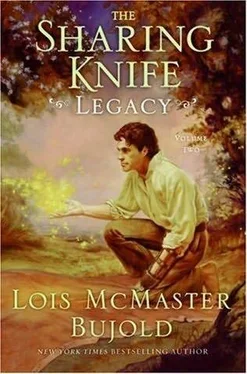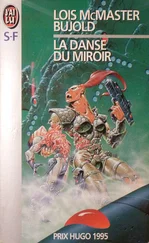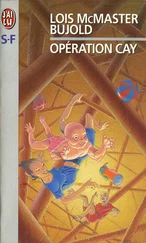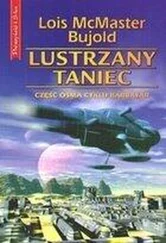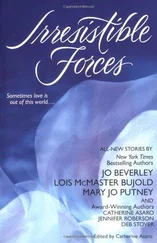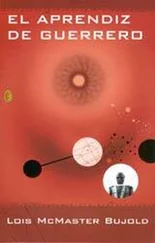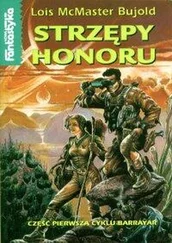“You know I said the old lords used their magic to alter plants, animals, and themselves. And their children.” He tapped his temple with the backside of his hook, and Fawn realized he thought his eye color was a relic of those efforts. “Extended life, improved groundsense and ability to move the world through its ground.” He glanced, briefly and uneasily, at his left arm held up, and she knew he was thinking about his ghost hand again. He let it drop again to his side. “We Lakewalkers, we think, are the descendants of lesser hinterland lords—what must the great ones have been like?
“Anyway. In their attempt to enhance themselves, the high lords drew in something from outside the world. God, demon, other. If they’d kidnapped a god, it would explain why the gods shun us. And the king combined with it, or it with him. And became something that was neither. Vast, distorted, powerful, insane, and consuming ground instead of…of whatever they’d intended.”
“Wait, are you saying your own king became the first malice?” Fawn rolled up on her elbow to stare in astonishment.
Dag tilted his head in doubt. “He became something. Some lords fell under his power—legend says—and some broke away. A war of matter and magic followed, which sank the lakes and left the Dead Lake and the Western Levels. Whether the malice-king’s enemies discovered how to destroy him, or it was another accident, any who knew died in the finding out. Someone back then must have discovered how to share mortality. It must have been a great sharing, is all I can say. Our malices came from some cataclysmic ground transformation when he, or it, was at last destroyed, and blew up into those ten thousand—or however many—shards or seeds or eggs. But that’s what we think the malices are all trying to do, clumsily, when they come out of the ground. Become kings again.
“Hence—to return roundabout to your original question—affinity. Malices take up Lakewalker mortality because they are, or were, partly us.”
Along the eaves, bones clanked in a breath of night wind. Fawn found herself trying to shrink under her blankets, which had crept, during this reciting, from her feet to her waist to her nose. This was worse than any tall tale her brothers had ever tormented her with. “Are you saying all those malices are your relatives?”
He lay back and, infuriatingly, laughed. “Don’t you just hate those family squabbles? Absent gods.” The chuckles died down before she got up the nerve to poke him in reproof. “Collateral ancestors at most, Spark. But I suggest you not share that insight around. Some folks are like to be offended.”
What have I married into, really? The revelations dismayed her. She thought back to her malice’s tormented, merciless eyes. They might have been tea-brown, with a certain now-familiar iridescence.
He let out the last of his black humor in a sigh. “If not relatives, they are certainly our legacy. Our joint inheritance. Not sure what my share is.” His hook drifted up to touch his heart. “One, I reckon.”
A chill shook Fawn at this vision of his mortal fate. “And you all so proud. Riding by us like lords.” And yet Lakewalkers lived, at home, in worse poverty than most farmers, unless the Bearsford camp was any more elaborate than this. She was beginning to suspect not. Noble grandeur was sadly lacking all around. Squalid scramble seemed a more apt description.
Dag shrugged. “We have to tell ourselves some flattering stories to keep ourselves going. Day after year after decade. What else? Lie down and die for the endless despair of it all?”
She lay back and followed his stare up into the dim rafters. “Is there an end?”
“Perhaps. If we just keep on. We think there were not an infinite number of malices planted. They don’t come up under water or ice or above the tree line, or on old blight. Our maps of the lairs we’ve destroyed show them thicker toward the Dead Lake, but fewer and farther apart going out. And we say they are immortal, but in fact all that have hatched have been slain. So maybe they wouldn’t live forever, but what they destroy betimes is more than enough. Maybe they’ll stop hatching out someday just for sheer age, but that’d be a bad hope to count on or dwell on. Like to make a man impatient, and this is no war for the impatient. Yet if all things end, even despair must, too. Not in my lifetime. But sometime.” He blinked up into the shadows. “I don’t believe in much, but I’ll believe that.”
That despair must end? Or, not in his lifetime? Both, likely.
He sat up and stretched his back, wincing, and, after a desultory futile prod at his arm-harness buckles with his splinted hand, extended it to Fawn to free him for the night. She unbuckled it and set it aside as usual, decided they weren’t going to do better than to sleep in their clothes, and, after a brief hesitation, cuddled down in her accustomed spot under his left arm, where she could press her ear to his heart. She pulled the blanket up over them both. Dag did not, by word or gesture, suggest lovemaking here tonight, and, relieved, neither did she. The fire died to embers before either of them slept.
D ag left on a mumbled errand soon after it was light, leaving Fawn to pack up. She had the bags and bedrolls stacked tidily on the porch, the cabin swept out, and even the fireplace ashes hauled away and scattered in the wet woods, with no sign of his return. She collected from the abundant new deadfall to replace the pile they’d burned last night, and then some, and finally sat on the porch steps with her chin in her hand, waiting. The flock of wild turkeys—or another flock, as there seemed to be a lot more of them this morning, upwards of forty—stalked through the clearing, and Fawn and they eyed each other gloomily.
A figure appeared on the path, and the turkeys ambled off. Fawn sat up eagerly, only to slump in disappointment. It was Dar, not Dag.
He glowered at her without approval but without surprise; likely his groundsense had told him where she and Dag had gone to hole up last night.
“Morning,” she tried cautiously.
She received a grunt and a grudging nod in return. “Where’s Dag?” he asked.
“He went off.” She added warily, “He told me to wait here for him till he got back.”
Another grunt. Dar inspected his lathe, wet but undamaged by the storm, and went around the cabin fastening open the shutters. He trod up the steps, stared down at her, slipped off his muddy shoes, and went inside; he came back out in a few minutes looking faintly frustrated, perhaps because she’d left nothing to complain of.
He asked abruptly, “You didn’t couple in there last night, did you?”
Fawn stared up in offense. “No, but what business is that of yours?”
“I’d have to do a ground cleansing if you did.” He stared at the firewood stack. “Did you collect that, or Dag?”
“I did, of course.”
He looked as though he was reaching for a reason to reject it, but couldn’t come up with one. Fortunately, at that point Dag came striding up the path. He looked reasonably cheerful; perhaps his errand had prospered?
“Ah.” He paused when he saw his brother; they exchanged equally laconic nods.
Dar waited a moment as if for Dag to speak, then when nothing was forthcoming, said, “That was a clever retreat last night. You didn’t have to listen to the complaints.”
“You could’ve gone for a walk.”
“In the rain? Anyway, I thought that was your trick—patroller.”
Dag lowered his eyelids. “As you say.” He nodded to Fawn and hooked his saddlebags and hers up over his shoulder. “Come along, Spark. G’day, Dar.”
Fawn found herself trotting at his heels, casting a farewell nod over her shoulder at Dar, who by the opening and tight closing of his mouth clearly had wanted to say more.
Читать дальше
